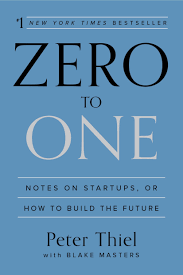Category: Business Creation
(99 von 100)
Why: I would like to create a 1-n company firstly, then 0-1.
Goal: Learn how to globalize and innovate.
Table of Contents
Action: Copy, Catch Up and Go Beyond.
3 Key Concepts
Summary
Pre-read material: Summary from the author Watch on YouTube
How to copy and catch up?
Learn from the best by comparing what they are doing and spot out what you are not doing.
Businesses do not have to be innovative to generate wealth. However, if you are aiming to make new things, capital is always appreciated. So copy their success and build on it.
When you are ready, then ask yourself questions from this book to re-invent the wheel and really go from 0 to 1.
This book points out that there is more to do, even when you are in the developed countries. So aim high and re-invent the market.
Opposite is More True
- It is better risk boldness than triviality.
- A bad plan is better than no plan.
- Competitive markets destroy profits.
- Sales matters just as much as product.
The key message is that innovation is the only way to survive in the long run. Either you copy them, or they copy you, the competition will get rid of all profits. So make your best effort to run away from the competition by the invention.
Grow and Endure
Most restaurants close within 2 years. Growing won’t matter much without the ability to last. Think customer!
Will this business still be around a decade from now?
Numbers alone won’t tell you the answer; instead you must think critically about the qualitative characteristics of your business.
Peter Thiel. “Zero to One.”
Right from Start
Take good care of the business foundation. Peter urges that we get it right from the beginning as many things are hard to change later.
If the founders do not work in harmony, it cannot be fixed down the road.
So “it’s useful to distinguish between three concepts:
• Ownership: who legally owns a company’s equity?
• Possession: who actually runs the company on a day-to-day basis?
• Control: who formally governs the company’s affairs?
A typical startup allocates ownership among founders, employees, and investors. The managers and employees who operate the company enjoy possession. And a board of directors, usually comprising founders and investors, exercises control.”
Excerpt From: Peter Thiel. “Zero to One.” Apple Books.
To sum up
To move our society forward, copying is not a sustainable solution. The competition will eat up all profits, and your firm will be left behind.
Get good at inventing; it is the only way to survive in business.

Goal check: I learned that we have no choice but to innovate our way to survive as an entrepreneur.
Wasu’s Review
( 4.0 / 5.0 )
Get this book on Amazon here!

